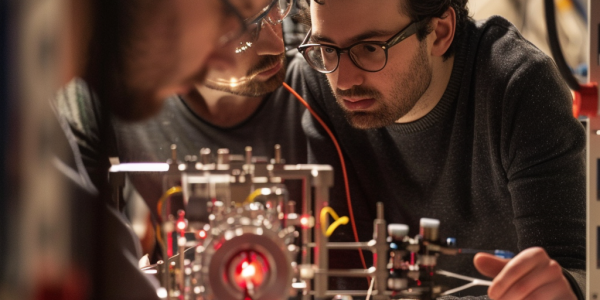Breakthrough in Vortex Electric Field Could Transform Electronic Devices
Researchers at City University of Hong Kong have discovered a novel vortex electric field in twisted bilayer molybdenum disulfide, promising to enhance electronic, magnetic, and optical devices. This groundbreaking study simplifies the generation of electric vortex fields, paving the way for advancements in quantum computing, spintronics, and nanotechnology. Led by Professor Ly Thuc Hue, the team developed an innovative ice-assisted transfer technique, allowing for precise manipulation of twist angles, which could revolutionize material science and technology.
Willow: A Breakthrough in Quantum Computing
Willow, Google’s groundbreaking quantum chip, is revolutionizing quantum computing with its ability to exponentially reduce errors and achieve unmatched computational speed. This technological milestone promises to tackle complex problems across various sectors, paving the way for transformative innovations in pharmaceuticals, materials science, and artificial intelligence.
Study Questions Openness of Large Language Models
A recent study from AI researchers at Cornell University and the Signal Foundation questions the transparency of open large language models (LLMs) like ChatGPT. The findings, published in Nature, argue that simply providing source code does not ensure true openness, as access to crucial training data remains limited. This raises concerns about privacy, job displacement, and the authenticity of AI-generated content. The study emphasizes the need for greater transparency, reusability, and extensibility in LLM development to foster genuine engagement and innovation in AI technology.
Argonne Scientists Receive $65 Million DOE Funding to Advance Quantum Computing
Three scientists from Argonne National Laboratory have received $65 million in funding from the U.S. Department of Energy to advance quantum computing technologies. Their projects aim to enhance quantum algorithms and software, with potential applications in energy, medicine, and national security. This initiative marks a significant step in harnessing quantum technology for solving complex scientific problems, paving the way for groundbreaking discoveries.
Revolutionizing Network Computations: ETH Zurich Researchers Develop Ultra-Fast Flow Algorithm
ETH Zurich researchers have developed an ultra-fast flow algorithm that revolutionizes network computations, optimizing transport flow with minimal cost for various networks. This breakthrough in computer science by Rasmus Kyng promises unprecedented speed and efficiency in solving complex optimization problems in transportation, logistics, and communication networks.
The Rise of On-Device AI: Revolutionizing Local Devices
Learn how on-device AI is revolutionizing the way local devices perform artificial intelligence tasks independently of cloud-based infrastructure. Discover the benefits of on-device AI, including lower energy consumption, cost savings, enhanced privacy, and improved user experiences.
Breakthrough in Quantum Computing with Microwave Circulator Device
Researchers at the University of Massachusetts Amherst have made a groundbreaking discovery in quantum computing with the development of a microwave circulator. This device allows precise control of nonreciprocity between qubits and microwave-resonant cavities, essential for quantum information processing. Their research, published in Science Advances, introduces a new theory that simplifies and enhances previous understandings of nonreciprocity, benefiting future studies in the field. Quantum computing, based on qubits in quantum superposition, offers enhanced computational power, while nonreciprocity opens up new possibilities for harnessing the full potential of the quantum realm.
Researchers Create Artificial Synapse Using Water and Salt, Mimicking Human Brain Medium
Researchers at Utrecht University and Sogang University have made a groundbreaking discovery in neuromorphic computing by creating an artificial synapse that operates using water and salt, mimicking the human brain’s medium. This innovative approach showcases the potential for more efficient and brain-like computer systems, paving the way for advancements in artificial intelligence and cognitive computing.
MIT Achieves Precise Control of Ultrathin Magnet at Room Temperature
MIT researchers achieve precise control of an ultrathin magnet at room temperature, paving the way for faster and more efficient processors and computer memories. This breakthrough could lead to magnetic-based devices consuming less energy than traditional silicon-based devices, offering unprecedented speed, efficiency, and scalability. The researchers utilized pulses of electrical current to switch the direction of the device’s magnetization at room temperature, harnessing the fundamental property of electrons called spin. This development is crucial as it makes magnets composed of atomically thin van der Waals materials practical for use outside a laboratory setting.
Quantum Computing and the Future of Copyright Law
A new study from the University of Exeter suggests that quantum computing will revolutionize copyright law, impacting the tracking and tracing of legal owners of artistic works. Dr. James Griffin highlights the potential for quantum computers to make judgment calls on copyright infringements, while also predicting a rise in unauthorized reuse of copyrighted materials. The study also anticipates an increase in enforcement of copyright law through technological protection measures, creating a complex landscape for copyright in the era of quantum computing.










